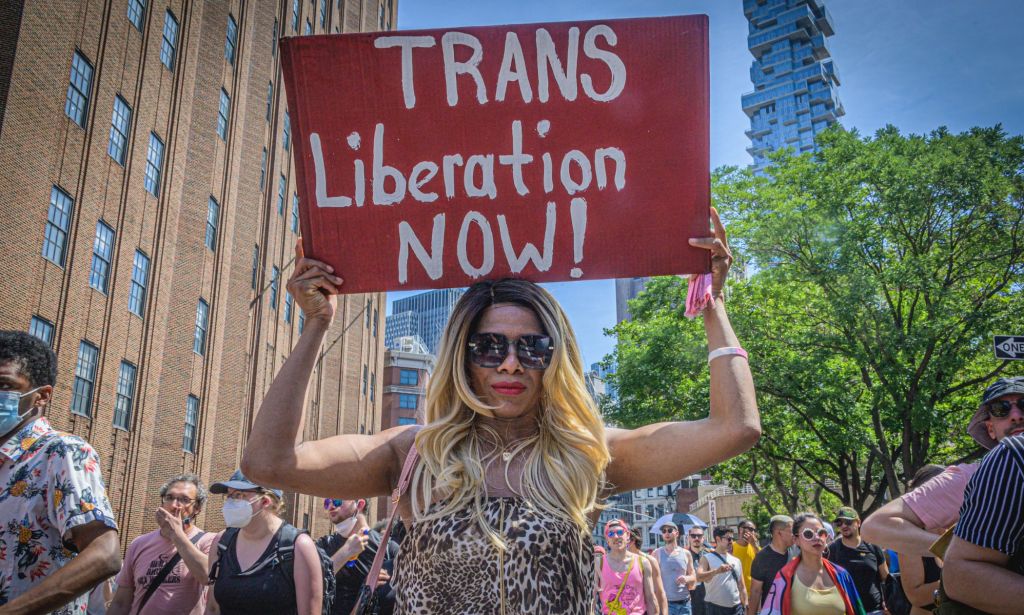Trans journalist Erin Reed on fighting anti-LGBTQ+ hate and working at the coalface of transphobia

Erin Reed said beginning her new job felt like a ‘trial by fire.’ (@erininthemorning Instagram / Raphael Renter / PinkNews)
Independent journalist Erin Reed might be one of the busiest legislative trackers of the year.
The trans blogger could scarcely sit down during her interview with PinkNews before the wheels of the US law-making machine started rolling once more, prompting Erin to scan, write and publish one of her widely shared and much-needed tweets tracking the American legal system.
Erin shares detailed, daily tweets dissecting the latest anti-LGBTQ+ bills and laws passed in the US, and dives into these in more detail on her Substack account.
She is also the fiancée of trans lawmaker Zooey Zephyr, who has made headlines herself recently after she was barred from the Montana State House for her vocal support of trans healthcare.
“It’s been a trial by fire,” Erin says. “It never stops, the beat goes on.”
Over the past few years, legislative attacks against the LGBTQ+ community have skyrocketed. Information from the Human Rights Campaign reports that US state governments introduced at least 315 anti-LGBTQ+ bills in 2022.
That number has jumped to more than 470 pieces of legislation proposed in 2023, at time of writing, with at least another 650 in circulation across various states.
While the effort to track these bills wasn’t her first foray into trans activism, this wave of institutional discrimination prompted Erin to prioritise detailing every hateful bill that she can.
“I started tracking legislation around three years ago,” she says. “It was after I created a hormone therapy informed-consent map [of] the United States.
“It’s a map that essentially lets trans people in the US know where they can go to obtain their hormones, and it caught fire. It blew up in the trans community – I think it’s been used 4.5 million times. A lot of people got their hormones because of that map, which makes me feel wonderful.”
The popularity of the interactive map led members of the community to start messaging Erin about issues in their own states which were forcing clinics shown on the map to close.
She went from there to tracking laws that were affecting the clinics listed on the site, then to tracking bills affecting the LGBTQ+ community as a whole.
‘One of the most important years in history’
Her succinct, comprehensive reports on what is happening in each state became so popular that, in response to the rise in anti-LGBTQ+ legislation, Erin Reed decided to start working as an independent journalist full time.
“I left my job knowing that this next year would be one of the most important in history,” she says.
“I started a newsletter, had a little bit of savings – I didn’t know how long that would get me by – and people have subscribed and allowed me to continue to follow all the hearings, all the bills, and that’s what I do.”
This year has been one of the most extreme for anti-LGBTQ+ legislation proposals in recent history, involving everything from vague anti-drag bills – potentially banning anything from pantomime to Shakespeare – to laws restricting or banning outright gender-affirming care for transgender citizens, particularly under-18s.
Lawmakers in states such as Texas and Tennessee are among the worst culprits when it comes to sweeping anti-LGBTQ+ legislation, with 52 bills being debated in the Lone Star state and 26 in the Volunteer state, according to the American Civil Liberties Union (ACLU).
Other states, such as Florida, are already seeing these bills signed into law thanks to vehemently anti-LGBTQ+ governors such as Ron DeSantis.

The frequency of these bills is so severe that independent journalists such as Erin often find it difficult to keep track. Thankfully, the LGBTQ+ community is ready and willing to help.
“A lot of what I have done is network-driven and I can’t do what I do without the community and the actors on the ground,” she says.
“I’ve gained a lot of activist connections and local organisations in each state. At this point, I have people in almost every state messaging me on a daily basis, letting me know: ‘Hey there’s this hearing going on right now.’
“I can’t always respond to them, but they know that I’m watching because I’ve spoken to them before. It helps me so much.
“Even my hormone therapy map was network driven – I did initial research like I do with the bills. I went to all the Planned Parenthoods, for instance. The map gets updated because I get, every few days, people [who] message me, saying, ‘This clinic closed down,’ or: ‘Hey, you don’t have my clinic on this map.'”
Erin Reed’s methodology for tracking down bills
In what is almost a depressingly convenient strategy, many of the bills being proposed by US Republicans have become so predictable in their verbiage that it’s actually relatively easy to track every single one.
The ACLU sorts each anti-LGBTQ+ bill into one of seven categories: accurate IDs, civil rights, free speech and expression, healthcare, public accommodations, schools and education, and miscellaneous.
While an overlap can occasionally occur, most of the so-called issues that Republicans use to justify these bills can be filed into one of these categories.
This significantly helps the likes of Erin Reed work out when a new bill is being proposed by using a set of keywords – the difficulty is keeping track on all of them at once.

“I’ve got, at this point, a query that I use on legal sites that essentially allows me to search for all of those [bills], and the query that I use uses keywords that, I have found, only appear in bills that target the trans community.
“Let me give you a really good example: biological sex. You never see those two words side-by-side unless it’s in a bill introduced by Republicans targeting the trans community, [in] anti-drag laws, [or] hormone-therapy bans.
“So, I get all these bills that target the community by looking at either what activists are sending me or by doing these late-night searches.
“What I’ll usually do is reach out to activists on the ground and I’ll say: ‘Hey, look, there’s this bill that’s about to come up. What are the chances of [it] passing, what’s going on?'”
What does the future hold?
For Erin Reed, the issue surrounding the wave of anti-LGBTQ+ legislation is not just the shocking volume of bills being proposed, but what they could mean for queer rights in the future.
A mixture of what she describes as a normalcy bias in legacy media reporting on anti-LGBTQ+ bills – where extreme laws are treated as acceptable – coupled with the increasingly volatile legislative treatment of the community could lead to a dire situation in the coming years.
“What I see is this continual sort of fracturing on this issue, and we’re going into the 2024 presidential election cycle, where I think that is going to be what the debates are about.
“We have states like Florida which are criminalising transgender people in bathrooms,” she continues. “We’re seeing bills that will forcibly detransition people, and these things are very frightening.”
But, the negative treatment of the community by lawmakers isn’t country-wide, with states such as Washington and California becoming safe havens for queer citizens to migrate to.
“Roughly half of the population in the country lives in states that are actually moving in the opposite direction and are extending rights to trans people that we have fought for.
“Here in Maryland, [politicians] passed a law that covers facial feminisation surgery, covers hair removal, modern standards of care for trans people that just isn’t limited to hormone therapy.
“And in Minnesota, we just saw a safe state bill – the governor there is pushing protections for trans people [who] can flee to Minnesota from other states.
“Right now in the United States, we are seeing a sort of balkanisation of transgender rights,” she adds.
“We need to make sure that we’re keeping a firm watch on what’s to come.”
How did this story make you feel?

